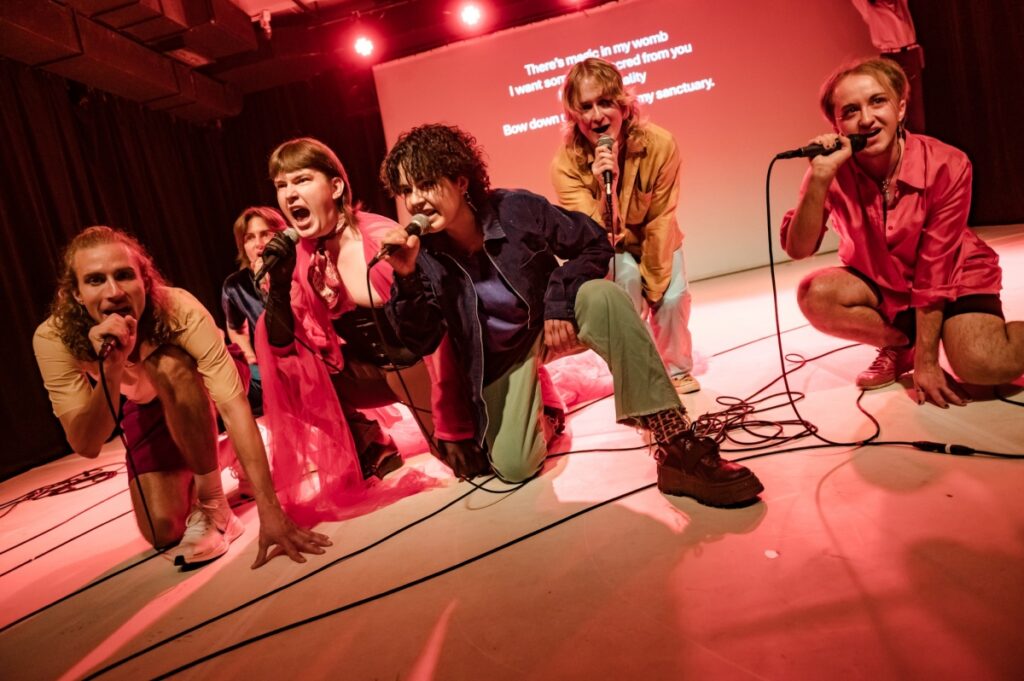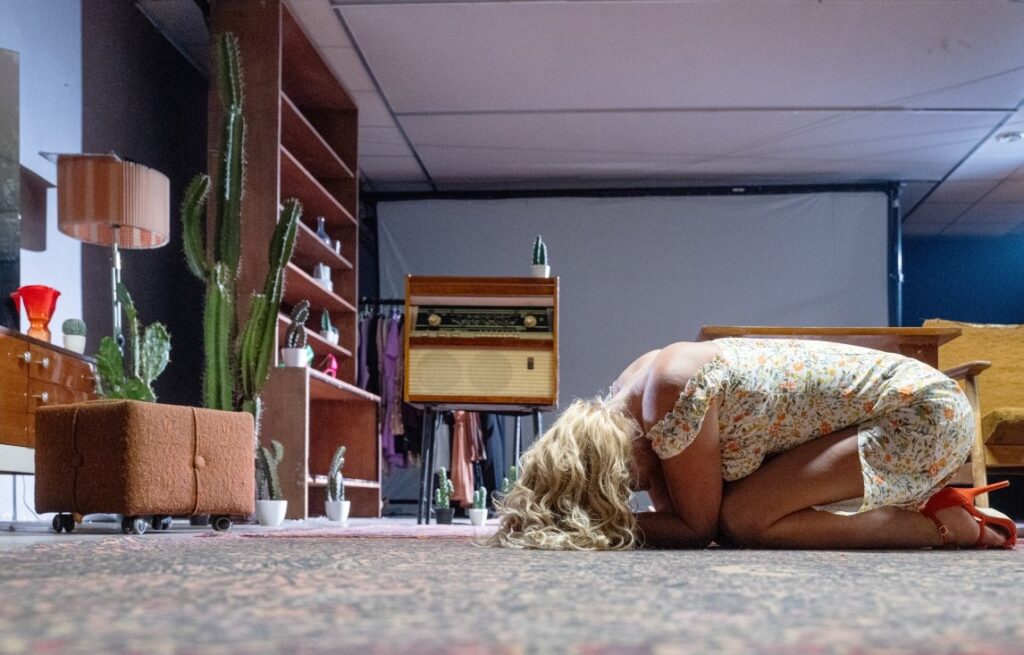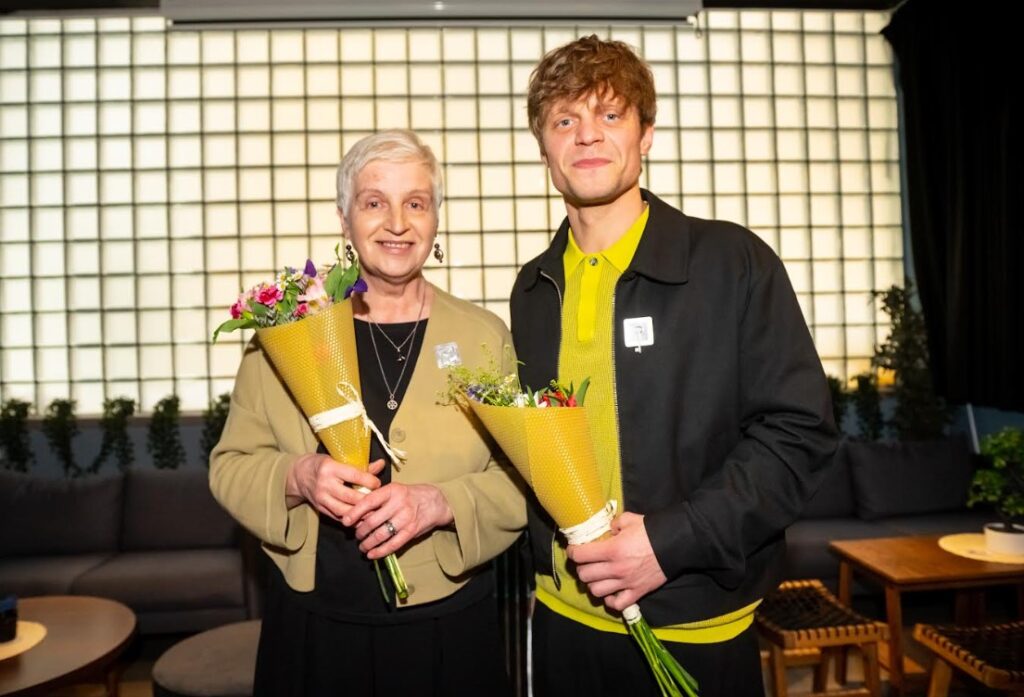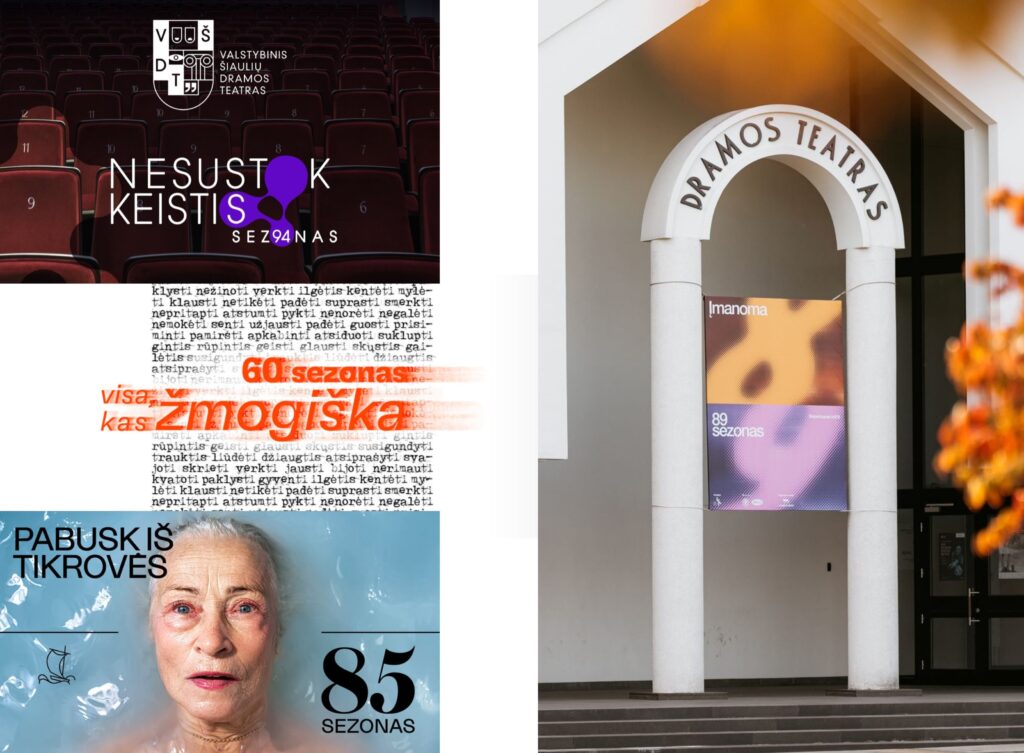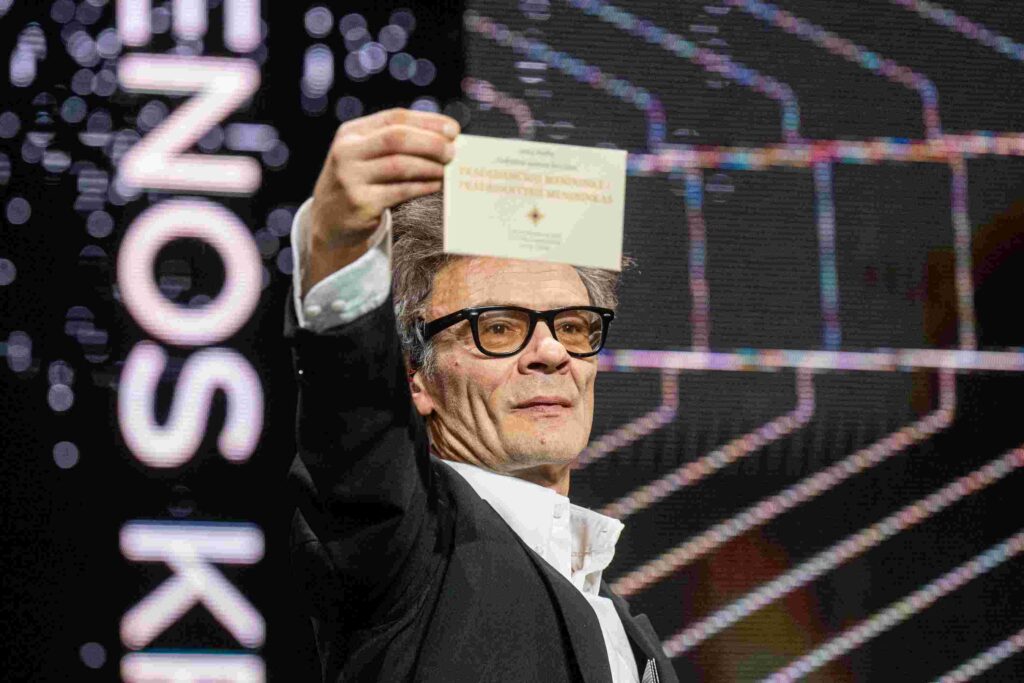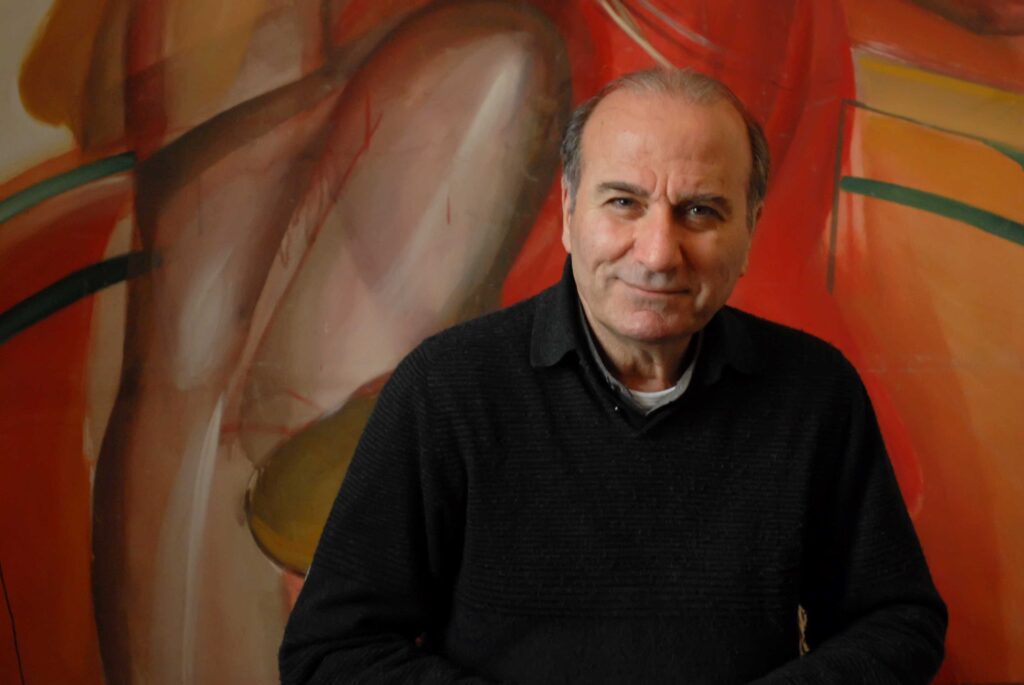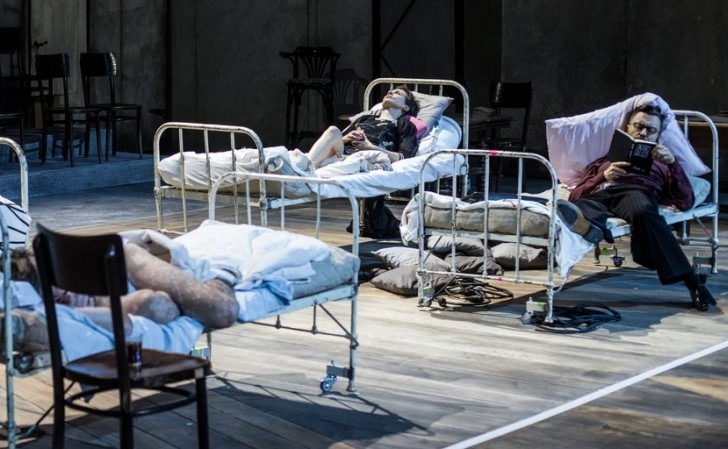The 2020-2021 theatre season was special for the performing arts in Lithuania and worldwide. On 7 November 2020, the country entered its second lockdown, which, while not preventing theatres and companies from carrying out administrative and creative activities, prohibited the organisation of public events. This period lasted until 15 April 2021, when it was announced that all cultural sector companies and organisations would be allowed to resume their activities from 19 April.
Naturally, the events did not start during the first days of ´freedom´. Unaware of when they would be allowed to reopen, theatres were unable to plan their repertoire and sell tickets in advance. I went to a performance as soon as possible, and that was on 29 April. The Russian Drama Theatre of Lithuania was one of the first (or even the very first) to present a première after the lockdown. It was a well-constructed and solidly performed production (in an old style not seen in Lithuania for a long time) entitled The Will. Based on works by Vasily Shukshin, the production was directed by the theatre´s artistic director Vladimir Gurfinkel (the only director to put on productions in his own theatre throughout the season).
Early in May, companies of young and independent artists were busy with premières. The state theatres only started returning to their former pace at the end of the month. Lithuanian theatres usually show few performances at the end of the spring: people tend to shun entertainment in closed venues during the warm season, so audience numbers gradually decrease. However, due to the lockdown, the season in state theatres extended until July, and in the independent sector until the very end of August. This extension was crucially important, since this year the season for the performing arts had lasted for only two months in the autumn and one month in the spring, a third of the usual theatre season.
A review of theatre repertoires revealed that, in terms of numbers of productions, the independent sector was the worst affected. This is related to the constant lack of funding, as well as the policy of the Lithuanian Council for Culture (the institution most concerned with financing the non-governmental sector) to prioritise projects that might continue in the event of an extended or a new lockdown (which translates into less funding for new productions and promotion). Meanwhile, the numbers of premières at state theatres remained impressive, even in the context of the situation: these organisations received regular funding, and after being granted additional funds to cover the losses associated with Covid-19, they managed to maintain pre-pandemic levels of creative activity.
Drama theatre
Oddly enough, at a time when people were advised to limit international travel due to the pandemic, most of the main staged works in Lithuania were produced by foreign directors. An important event of the season was The Republic at the Lithuanian National Drama Theatre, directed by Lukasz Twarkowski, a seven-hour performance, which invited viewers to create their own spectacle while wandering around the rooms, bars, the sauna and the rest areas at Film Cluster, all ending with a rave party. Through the production, people who had spent quite a long time in lockdown faced a serious challenge: after a long break, viewers were invited to be close to each other, to interact, socialise, and enjoy themselves in a crowd.
Krystian Lupa, one of the most prominent directors in Poland, and even Europe, came to work in Lithuania for the second time. He directed Austerlitz at the State Youth Theatre, based on the novel by Winfried Georg Sebald. The piece investigates a theme that has gained relevance in Lithuania in recent decades, namely the trauma of the Holocaust, stories, lost roots, and its impact on later generations.
Polish directors were responsible for a significant part of the 2020-2021 season´s repertoire at Klaipėda Drama Theatre. Curiously, all three premières of the season were produced by artists who are active in neighbouring countries: Laura Groza-Ķibere from Latvia directed Children of the Sun by Maxim Gorky; the Polish director Agata Duda-Gracz created a play and a performance about the life and work of the Italian artist Caravaggio; and Jan Klata, another artist from Poland, directed a production based on Boris Godunov by Alexander Pushkin. In the autumn of 2021, the Polish theatre researcher Łukasz Drewniak wrote an article expressing his concern that Polish directors were taking over Lithuanian theatre, and local artists can do nothing to prevent it, since there are no promising young artists to match the great but gradually disappearing Lithuanian directors of European fame (Oskaras Koršunovas, Gintaras Varnas, the late Eimuntas Nekrošius, etc). This idea briefly prompted the local theatre community to think how much money was being invested in foreign artists compared to the meagre amounts granted to young local artists. However, these discussions petered out after a few weeks, without resulting in any positive initiatives.
A notable event of the season showing the social climate in Lithuania was related to the decision of the Lithuanian National Drama Theatre (LNDT) to invite the Belgian artist Jan Fabre to direct a new production: a sketch from his Night Writer was promoted widely enough to regard the event as a première. The phenomenon prompted critics and journalists to ask a question of ethics: why is a national European theatre inviting and promoting a person with a long history of accusations of sexual assault? When these questions were asked at the presentation of the sketch, the theatre claimed it did not want to judge the person before a court passed its verdict. When the date of the artist´s court hearing was publicly announced, the LNDT declared that the première would be cancelled.
The popularity of foreign artists on the Lithuanian stage might be determined by purely pragmatic tendencies. First of all, there are few theatre directors in Lithuania, so theatres presenting up to six premières per year would simply be dependent on all the same people. Secondly, guest directors put on productions at state or local government-funded theatres (for example, foreigners produced three out of the seven premières at the regional Alytus City Theatre, with the manager of the theatre claiming that it was easier to attract foreign directors than young Lithuanian artists), whose regulations require them to present works by foreigners.
The same rules require these theatres to show productions by prominent Lithuanian artists, including works by young directors. The productions by leading Lithuanian directors presented during the 2020-2021 season did not offer any new aesthetic angles or approaches that could not have been anticipated from them (or the country´s theatre). Meanwhile, young artists seem to be increasing their share of the repertoire. During the last season at the LNDT, works by Motiejus Ivanauskas and Antanas Obcarskas (neither of whom graduated in directing) stood out and attracted critical acclaim. The productions by the former are distinguished by their minimalism, irony and ingenuity, while the works by the latter feature political and philosophical contemplation, concealed dramatism, and vivid visual treatments.
In most of Lithuania´s state theatres, more than half of all the premières of the 2020-2021 season were presented by young directors. Interestingly, the productions by the younger generation at the National Kaunas Drama Theatre were shown exclusively during lockdown, and remotely. This is probably how the theatre (mostly supporting safe and more conservative performances) discovered a space to present theatrical experiments painlessly. These experiments included a live broadcast of the première of The Shoemakers, based on the play by Stanisław Witkacy, and directed by Obcarskas. Another notable example was the piece Spaced Away, specifically created for the video platform by Agnija Leonova, a theatre director who is interested in theatre and technology, and especially in artificial intelligence. A unique solution was proposed by Augustas Gornatkevičius, who invited viewers to a Facebook group spreading conspiracy theories, where the viewers´ reactions, comments and speculation became an unpredictable part of the events and predefined content. It is a true interactive performance, nevertheless protecting the actors and viewers from intimidating direct contact.
For understandable reasons, the independent Lithuanian theatre sector was far less productive. After the death of Eimuntas Nekrošius in 2018, the Meno Fortas theatre he established focused on productions by his pupils, and did not present a single première during the last season. Keistuolių Teatras, the first independent theatre in Lithuania, also did not produce any premières, while waiting for the renovation of its theatre space to be completed. Meanwhile, Gildas Aleksa, the leader of the Teatronas company, and Artūras Areima, the director of the Areima Theatre, were some of the few who still tried to reach audiences remotely. Aleksa presented a recorded performance The Final Final Final, made entirely from the endings of literary, cinema and theatre works. Areima took an interdisciplinary approach, and presented versions of performances specially adapted for the screen, calling them films. The Oskaras Koršunovas Theatre was noteworthy in this context, running a play-reading series on Zoom. However, it was a one-off phenomenon, which did not open up any new avenues for Lithuanian theatre (it is amazing, though, that one of the readings received over 100,000 views).
Another interdisciplinary work was presented remotely by Greta Grinevičiūtė, an artist with a contemporary dance background. She is a universal artist, appearing as a dancer, choreographer, actor, and performer of diverse actions akin to performances. With her longstanding interest in the dance film genre, she presented a live broadcast of Dance for Washing Machine and Mom, the second part of a performance series for objects and close people. This adaptation of the piece for remote viewing was perhaps the most successful production of the season. However, its autobiographical aspect seems more important. The production deals with the artist´s personal experience: her relationship with her mother, who committed suicide when her daughter was just a few years old. The work revealed a tragic and clearly still painful experience, attracting attention to the increasing tendency towards self-therapy on the Lithuanian theatre stage; at least three solo performances presented during the season featured actors telling painful personal stories that have left deep scars and serious consequences.
Dance
Numerous solo productions based on important individual and universal contemplations were presented by creators of contemporary dance during the 2020-2021 season. This was greatly influenced by the pandemic, which locked the artists in their homes, alone, without people, with only their bodies and their thoughts. It might also have stimulated the appearance of some fascinating works in Lithuania´s largest international contemporary dance festival, New Baltic Dance. These pieces came mostly from young artists who completed their studies abroad and are currently building their international careers. Dovydas Strimaitis, Lukas Karvelis and Anna-Marija Adomaitytė (whose latest work was recently featured in the Aerowaves dance network´s top 20) are three young dancers/choreographers searching for their own body philosophies, and are perfectly prepared for appearing on the best stages in European contemporary dance.
Vilma Pitrinaitė, one of the most interesting artists, who is renowned for the richness of genre and amazing sense of the absurd, also presented a solo piece at the festival. The performance It´s not your Dream integrated the personal experiences of an individual longing for interaction but unable to achieve it. While it sounds sad, the artist presents a conversation with herself and a real or imaginary audience (the performance was broadcast live during lockdown) in an ironic and absurd way, bordering on colourful kitsch. All of this is dropped into the second part (no interval!) of the performance, where she pursues the topic of the human´s attempt to be set free further, this time moving towards an analysis of protest (body) culture. Saturated with personal experiences and a global reflection of the surrounding environment, this performance marks a socially significant direction for Lithuanian dance. There is not too much of this: during the 2020-2021 season, this connection emerged in Workpiece by Adomaitytė, addressing the body memory of workers in fast food restaurants, and in Marked by Niel Claes, a dancer at the Klaipėda-based Šeiko Dance Company, which looked at the issue of teasing, which turns an imperfect human body into a prison of its mind.
The 2020-2021 dance season displayed an emerging search for unconventional forms. While it does not sound new or unexpected in the context of the 21st century, this concentration of successful works in one season proves that the creators of contemporary dance in Lithuania are turning towards personally resonant solutions. One of the most artistically and commercially successful projects was I´m Going to Buy Some Milk, an excursion around a Vilnius suburb that is rarely entered by outsiders, organised by the Be Company team. This performance, where participants and local residents are actors and audience for each other, turned into an unexpectedly suggestive and even nostalgic connection between the Soviet heritage (architectural and spiritual) and the freedom to be misunderstood. In fact, the format of dance excursions, and especially site-specific performances, is nothing new in Lithuania. Be Company presented a trip around the centre of Vilnius, while the municipality-funded Šeiko Dance Theatre and Kaunas Dance Theatre Aura used dance expression to familiarise audiences with the most spectacular open spaces in their cities or regions.
One might think that Lithuanian dance underwent a clash between the 20th and 21st centuries during the 2020-2021 season, seeking for personal and relevant relations with legendary masters, along with an interest in the wider applications of dance extending beyond mere picturesque presentations to viewers in the stalls. Low Air, Lithuania´s only urban dance theatre and school, dedicated its season to open-air appearances and social actions (one of the theatre´s founders has a background in social pedagogy); prior to the new season, they used the space of a former gallery to present the production We, The Clique, featuring long-term pupils of the school aged between 16 and 22. The production, which uses their personal experience, is currently on a successful tour of foreign festivals.
The turn of the century can also be seen in the decisions of old hands to choose spaces that are otherwise unsuitable for theatre. Aira Naginevičiūtė, one of the country´s most prominent choreographers, started the season with a corporal project, where viewers were placed in huge cylinders, while the dancers were left to roam around freely. At the end of the season, she invited the audience at the New Baltic Dance Festival to take part in a seven-hour-long installation named after one of her best-known performances, Pregnant Silence. Viewers were made to lie down under metal constructions, and were encouraged to meditate while watching barely moving dancers several metres above them. Naginevičiūtė´s new projects seem to completely reject the traditional box of the stage, along with the very concept of ´a spectacle´.
Unlike most choreographers of her generation, Birutė Letukaitė, the founder of the first professional dance theatre, who frequently invites foreigners to take part in an international team of Aura dancers, was all alone when she created the repertoire for the 2020-2021, presenting all three premières of the season. A similar approach to the theatrical repertoire, via the equal combination of classic and modern expression, was displayed by Anželika Cholina, the choreographer of Queen of Spades, who is currently working in Russia. The same can be said of Birutė Banevičiūtė, an internationally acclaimed specialist in dance for infants and children, who presented two premières: a performance featuring children with disabilities, and a production aimed at children three to six years old. Šeiko Dance Theatre was especially successful in maintaining the pre-lockdown tempo: during the pandemic season, it presented six premières, produced by the theatre´s artistic director Agnija Šeiko, dancers with the theatre, and prominent foreign choreographers (such as Rachid Ouramdane, the director of the Chaillot National Dance Theatre in France).
One might wonder why only the contemporary direction of dance comes out when speaking of Lithuanian dance. Where did ballet go? There were no notable ballet productions during the 2020-2021 season. Unlike contemporary dance, Classical ballet in Lithuania is solely the privilege of state theatres. There are ballet companies at the Lithuanian Opera and Ballet Theatre, and at the three state musical theatres, in Kaunas, Klaipėda and Panevėžys. The ballet company at Klaipėda Musical Theatre still has no home, as the theatre is under reconstruction. In recent years, the company has focused mostly on contemporary ballet, and even contemporary dance, and during the 2020-2021 season Classical productions were limited to dance diptych and ballet gala concerts. No dance premières were presented at the Kaunas and Panevėžys theatres in 2020-2021, while the sole dance evening (not entirely Classical, as it featured tango) presented by the LNOBT took place in the open air, in the courtyard of the Palace of the Grand Dukes of Lithuania in the centre of Vilnius. Ludwig Minkus´ Paquita, together with Bolero, will be presented only on the theatre stage at the end of the season. Musical theatre was significantly more prevalent in the LNOBT´s 2020-2021 season.
Musical theatre
Rima Jūraitė
Despite the lockdown restrictions, which froze theatres´ activities for nearly half the season, the 2020-2021 season in Lithuania´s musical theatres was distinguished by numerous premières and variety in the repertoire, featuring works of different genres and epochs, as well as entirely new productions. Works of musical theatre were presented at state theatres, and premières were also initiated by independent creative companies and festivals.
During this period, the country´s largest musical theatre, the Lithuanian National Opera and Ballet Theatre (LNOBT), based in the capital, presented four premières and one concert opera performance specially adapted for outdoors. The season opened with a unique project, the comic intermezzo La serva padrona by Giovanni Battista Pergolesi (directed by Gediminas Šeduikis), a production on a truck, accommodating a stage for the singers and space for a chamber ensemble, which premièred on 5 September 2020. It is a mobile production that can be shown in squares or parks in different towns, reaching audiences in remote regions, and providing an opportunity to experience professionally performed opera, giving the production an important educational function as well.
The LNOBT presented three premières on its main stage during the season, including opera, operetta and ballet. Gaetano Donizetti´s bel canto masterpiece Anna Bolena premièred on 4 October 2020, presented by an Italian creative team, consisting of the director Andrea de Rosa and the music director and conductor Sesto Quatrini. Co-produced with Opera di Roma theatre, it was the first production of this opera in Lithuania. An operetta of Spanish music, Sarsuela (director and choreographer Jūratė Sodytė, conductor Martynas Staškus), premièred on 10 June 2021. It was performed mostly by members of the younger generation of LNOBT soloists, with participants in the theatre´s Opera Training Programme. It is another work with education in mind, aimed at including young professional opera singers debuting on the main stage in the theatre repertoire. Sarsuela consists of well-known Spanish arias, songs and dances. The music director and author of the concept, who is also one of the curators of the training programme, is the famous opera singer and pedagogue Professor Vladimiras Prudnikovas.
To celebrate State Day in Lithuania on 6 July, the LNOBT initiated a concert performance of the opera I Lituani by Amilcare Ponchielli in the courtyard of the Palace of the Grand Dukes of Lithuania, directed by Gediminas Šeduikis and conducted by Gintaras Rinkevičius.
On 31 December 2020, the Lithuanian National Opera and Ballet Theatre planned some festive events to mark the centenary of professional opera in Lithuania, as well as the première of a new production of Verdi´s La Traviata (a production of the opera in 1920 marked the beginning of professional Lithuanian opera). However, this important date was not commemorated, due to the introduction of a strict lockdown, which forced the theatre to postpone the première of La Traviata until the autumn of 2021.
Kaunas State Musical Theatre presented two premières during this period. Frederick Loewe´s musical My Fair Lady premièred on 28 August 2020, directed by Viktorija Streiča and conducted by Jonas Janulevičius. The operetta The King´s Double by Tadeusz Dobrzanski premièred on 29 October 2020, directed by Kęstutis Jakštas and conducted by Virgilijus Visockis. Another production of La Traviata was scheduled to première at Kaunas Musical Theatre on 31 December 2020 (also to mark the centenary of professional opera in Lithuania), but due to lockdown restrictions it was postponed until December 2021.
Klaipėda State Musical Theatre opened its season with a production of the operetta Orpheus in the Underworld, which premièred on 18 September 2020, directed by Rūta Bunikytė and conducted by Tomas Ambrozaitis. The activities of the theatre´s dance-ballet company became more noticeable during the season; the company attracted young dancers, the repertoire was expanded, and several premières took place. In the last season, the theatre had presented the world première of a dance performance Faust, prepared with a team of Polish artists. Due to lockdown restrictions, the première was first recorded and broadcast on television on 25 December 2020 (choreographer Robert Bondara, music director and conductor Modestas Barkauskas). Also, together with an international team of creators (from Slovenia, Spain and Lithuania), the theatre presented a diptych of one-act dance performances at the end of the season: Pergolesi´s Stabat Mater and Stravinsky´s Le Sacré du printemps, which premièred on 13 August 2021 (choreographer Edward Clug, music director and conductor Tomas Ambrozaitis). The première took place in the shipyard of the port city, and later transferred to the theatre. During this period, the proactive ballet company Klaipėda Musical Theatre also prepared and presented two concert programmes featuring choreographic miniatures.
During the 2020-2021 season, Panevėžys Musical Theatre focused mostly on the organisation of concerts.
Apart from state theatres with regular repertoires, independent creative teams and festivals made a significant contribution to opera and productions of contemporary musical theatre.
A concert performance of Puccini´s opera Le Willis premièred at the initiative of the Lithuanian State Symphony Orchestra, under the artistic director and principal conductor Gintaras Rinkevičius. It opened the 26th Pažaislis Festival on 18 June 2021, and was the first performance of the opera in Lithuania.
The season was generous not only to music theatre lovers in large cities, but also to holidaymakers in seaside resorts. The première of Händel´s opera Acis and Galatea, initiated by the opera singer Lauryna Bendžiūnaitė, became part of the ´Neringa - Lithuanian Capital of Culture 2021´ project. It was presented in a school sports hall in the resort town of Nida, one of the towns of Neringa. This Baroque opera, prepared with Lithuanian performers and guests from Great Britain (music director and conductor Trevor Pinnock, director Peter Cant), premièred on 9 July 2021. Another production presented in Nida was the contemporary opera-sonic walk entitled Chronicle of Nida School, a journey imparting a chronicle of Nida´s history, the sonic route of which was based on the real stories of Nida residents (director and composer Jonas Jurkūnas, libretto by Kristina Savickienė). It premièred on 30 June 2021.
The 23rd Chamber Music Festival Curonian Spit 2021, which took place at Juodkrantė (another resort town in Neringa), presented the première of the opera triptych Neringa (Sea, Dunes, Pines) on 14 August 2021, created by the composers Vaida Striaupaitė-Beinarienė, Loreta Narvilaitė and Algirdas Martinaitis, the librettist Gintarė Dikšienė, the director Vytautas Rumšas, and the music director Robertas Beinaris. The performance was shown in the amphitheatre of the Ludvikas Rėza Culture Centre.
On 9 October 2020, the production company Operomanija, the most prominent creator of contemporary music theatre in Lithuania, presented the musical images Radvila Darius, Son of Vytautas, a production combining live music with archive footage from Lithuanian television (director Karolis Kaupinis, dramatist Birutė Kapustinskaitė). After the lifting of several decades of Soviet censorship, the country´s national television was filled with the voices of society freely expressing opinions, which served as an inspiration for the dramaturgy of musical images.
The company Kosmos Theatre presented a production based on the principles of acoustic theatre at Kaunas City Chamber Theatre. It showed the première of the cosmological opera Anatomia | Signs by the composer Mantvydas Pranulis, an interactive performance of soundscapes, combining archaic sound with innovative means of musical expression, on 25 August 2021.
The wide range of productions presented in this review shows that musical theatre in Lithuania is becoming increasingly varied: we are witnessing a many works from different epochs, the first Lithuanian productions of the world´s best operas, world premières of works by Lithuanian composers, and an increasing interest in contemporary opera, seeking new forms, themes and means of expression. The country´s most prominent artists work actively for Lithuanian musical theatre, along with foreign directors, choreographers and conductors.
Opera and musical theatre are spreading throughout Lithuania, and the geographical coverage of musical theatre is increasing. Productions are put on in major cities and state repertory theatres. At the same time, musical theatre productions reflecting local themes are created in the regions, and mobile opera is touring the smaller towns. Opera is often included in open-air cultural festivals during the summer. Another initiative born in 2021 should be mentioned here too: the production company Operomanija and the Lithuanian National Opera and Ballet Theatre joined forces to implement a new project called Opera Genome, aimed at encouraging creators of contemporary opera.
Puppet theatre
Ingrida Ragelskienė
The national UNIMA (International Puppetry Association) Centre in Lithuania has over 60 individual members, and also professional theatres, such as the Vilnius Lėlė Theatre, Klaipėda´s Puppet Theatre, the Kaunas State Puppet Theatre, Panevėžys´ Puppet Wagon Theatre, the Alytus Puppet Theatre Aitvaras, and the Table Theatre. Every other year, Materia Magica, one of the most prominent international theatre festivals in Lithuania, presents leading puppeteers at the initiative of the Klaipėda Puppet Theatre. In 2021, the Panevėžys theatre celebrated its 35th anniversary, while Aitvaras, the only professional puppet theatre in southern Lithuania, was part way into its 25th season.
One can only imagine the trepidation of Lithuanian puppeteers when waiting for the announcement of nominations for the annual Golden Cross of the Stage theatre awards: will puppet and object theatre be nominated separately, or will it be placed in the category of youth and children´s theatre, as usual? This happened in 2021, when Klaipėda Puppet Theatre was awarded for its Big Bang production in the youth and children´s theatre category. The performance Duck, Death and the Tulip by the Vilnius Lėlė Theatre, which won the award in 2020, was also featured in the same category. It is rare that puppeteers compete for the award outside the nomination category that features their colleagues who create productions for children in drama theatres. While reviewing the results of the past season in puppet and object theatre, we have to admit that the most relevant, strongest and most interesting productions were for adults and youth, and not for children.
I would like to single out my three favourite puppet productions of the season: Forest of the Gods directed by Agnė Sunklodaitė at the Kaunas State Puppet Theatre, The Nest by Motiejus Ivanauskas at the Vilnius Lėlė Theatre, and Archaeology of Goddesses directed by Saulė Degutytė at the Table Theatre. Although all three productions were inspired by radically different literary sources, ranging from the autobiography of Balys Sruoga to the fables of Ivan Krylov, and sutartinės, Lithuanian songs revealing female power, there is one common artistic denominator that unites all three productions. One might say that these works represent theatre that is unique in its artistic expression, is challenging, and is not looking for an easy or conventional means of communication with the audience. The directors of these three premières in 2021 dared to retain a high level of authenticity; in fact, each of them asked the key question: How can I, as an individual, contribute to the change of society and the improvement of the world? An obvious answer is by maintaining humaneness and affinity in individual creation.
If Balys Sruoga, a classic of Lithuanian literature, was alive today, crowds of admirers of stand-up comedy would gather to listen to him. It would be uncharacteristic of him to avoid what is significant to society, taking the position of quiet intelligent swine. Sunklodaitė´s production Forest of the Gods displays the sharp satire of the author: the biting grotesque is visualised through the black and white aesthetics of the set design, either reducing classic stick puppets to clones of the main characters with amazing micro-realism, or enlarging them as cripples that can only be managed by three actors, representing the skeletons of people condemned to death. The performance uses the heads of puppets in a striking way, transforming the bodies of the actors wearing them into formidable caricatures of degraded concentration camp supervisors enjoying cruelty. Puppets in contrasting sizes, actors operating them with great precision, capable of acting dramatic scenes simultaneously, all in a tight space transformed via precise visual means, leaves an indelible impression of the collapse of the world, divine order and harmony, at the same time as retaining hope for renewal and resurrection.
The creation of The Nest at the Vilnius Lėlė Theatre began in 2021, as part of the contemporary puppet and object theatre laboratory SurReality Check that took place at the theatre. In trying to manage complex reconstruction processes, the theatre is undergoing a true explosion in creativity; with currently only two auditoriums at its disposal, it presented an impressive number of premières for young audiences, including Cipollino directed by Šarūnas Datenis, Oh Lord, Lithuania directed by Ainis Storpirštis, and Clouds by Aušra Bagočiūnaitė Paukštienė. The theatre is successfully continuing its cooperation with the Ljubljana Puppet Theatre, the Academy of Arts and Culture in Osijek (Croatia), and Puppet Animation Scotland. This cooperation began in 2020, and has evolved into the international project Contemporary Puppetry Critical Platform. The educational and laboratory activities at the theatre are inseparable from the creative initiatives of the young director Žilvinas Vingelis. One recent première, Kafka Insomnia, presented at his own Kosmos Theatre, stands out as a unique interdisciplinary phenomenon, combining musical, visual, object, and (partially) puppet theatre.
Contemporary circus
It is very difficult to tell foreign readers about contemporary circus in Lithuania. For many years, performers would visit Lithuania once a year, during what was then the only international festival. It took a long time for the first Lithuanians to start studying this art professionally. A few more years had to pass before the decision bore fruit (its proponents had to learn the basics and acquire skills that could be applied in creative expression).
The 2020-2021 season was a turning point, marking a leap by contemporary circus towards the creation of quality productions. Although the continuing pandemic hindered the fully fledged implementation of international contemporary circus festivals, namely New Circus Weekend in Vilnius, and Cirkuliacija in Kaunas (the former had no programme, and the latter could not achieve its main purpose, to gather a community together), local artists were much stronger and more productive than before. We still cannot compare contemporary circus in Lithuania with countries that have been cultivating the field for many years, so the 2020-2021 season is mainly of interest to Lithuanians, and only later can it address foreigners, who should start looking into contemporary circus in Lithuania.
In October 2020, the Circo Sapiens Centre (established by the Teatronas Association, led by Gildas Aleksa, the organisation behind the Cirkuliacija festival) opened to people of various ages who are interested in studying circus disciplines. Its teachers include members of the Kanta Company, namely Kęstas Matusevičius (Lithuania), Aino Mäkipää (Finland), and Lyla Goldman (USA). The company put on the production Clothes and Us at New Circus Weekend, or more precisely, at the Lithuanian Circus Afternoon, and, for the first time in the festival´s history, it proved to be more interesting than the foreign productions. Although it presented sketches rather than finished works, the all-day performance proved that Lithuania has sophisticated artists who have mastered diverse circus techniques (handstands, floor acrobatics, ropes, clowning, silks, Chinese poles), and who are able to apply their skills to putting on fully fledged productions.
Few contemporary circus productions were created during the 2020-2021 season. Nevertheless, the number of new works was greater than during the previous seasons. Konstantin Kosovec (ropes), perhaps the most professional and experienced aerial acrobat, started the season at the Swedish DOCH University, presenting the circus and light performance Endurance, an impressive work, albeit too costly to be performed frequently. Marija Baranauskaitė, one of the best-known professional clowns in Lithuania (who came to prominence with the clowning and physical theatre performance Sofa Project for sofas), has collaborated with cello players, and presented the new circus performance For Cellos, where she continued her exploration of the relationships between people and objects. The Cirkuliacija festival presented Mood, a physical theatre performance based on floor acrobatics by Džiugas Kunsmanas, investigating the fear of living.
It is still impossible to identify or specify the trends in contemporary circus in Lithuania. Several years ago, we were happy to see any manifestation of creativity by local artists; today, we enjoy any work that approaches a quality production. Even though Lithuania is not a strong contender in the international circus field, the first steps have been taken. These examples will soon encourage more professional interest in circus, and the newly opened circus centre provides the opportunity to do so as quickly as possible.



